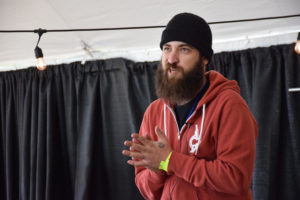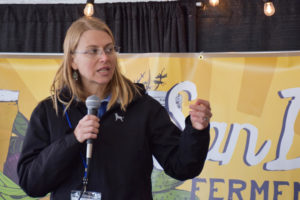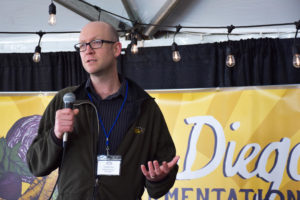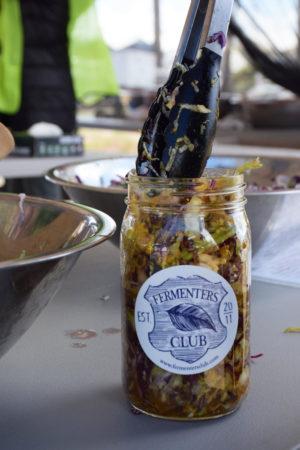A good gut feeling: Fermentation, food are focus of Encinitas event
The Fermenters Club held its fifth annual San Diego Fermentation Festival at the Leichtag Commons farm in Encinitas on Feb. 17.
During the festival, attendees learned about the many ways that fermentation is used in the production of food and beverages. Vinegar, sauerkraut, miso, pickles, kimchi, kombucha, sourdough bread, yogurt, beer and wine are just a small list of products made using the process of fermentation.

“Fermentation permeates our everyday lives a lot more than we would think,” said Erik Fowler, education curator for White Labs, a yeast and fermentation laboratory and brewery in San Diego. “(When) most people wake up in the morning, they might have a cup of coffee, yogurt and maybe a bagel. Those are three fermented products that you’ve consumed before you leave your house.”
Festivalgoers were able to learn how to make their own apple ginger sauerkraut in take-home demo jars at a hands-on table and nibble on samples of products from local artisan producers of fermented products.
Local breweries, meaderies, distilleries and alcoholic kombucha producers served tastings of their products in the Ambrosia Garden to those who had purchased the pass upgrade. Businesses in the tasting garden included Second Chance Beer Co., Culture Brewing Co., Golden Coast Mead, JuneShine, Raging Cider & Mead Co., White Labs and the Misadventure & Co. distillery.

San Diego’s chapter of Slow Food hosted a culture petting zoo for kids and adults to feel the different types of bacteria used to produce kefir and kombucha.
The Fermentation Festival also featured workshops and lectures on kombucha brewing, alcoholic beverages, pickling, cheesemaking, brine, sauerkraut production and the biology of soil.
Discussing the history of fermentation in beverages during his lecture at the festival, Fowler discussed how the biology and knowledge of yeast strains have evolved over the years.
“When you’re picking up these products, think about how they were made, the time put into them and how these cultures created the complexity that we’re consuming,” Fowler said. “Without brewer’s yeast, we would not have alcohol. Alcohol fermentation is used to create over 500 flavor and aroma compounds.”

White Labs cultivates yeast strains that are used in breweries around the world.
“We are in 82 countries,” Fowler said. “Last year at the Great American Beer Festival — which is the largest beer festival each year in Denver, Colorado — 60 percent of the beers used our products and services in the previous 12 months.”
Julia Gauglitz, Justin Shaffer and Daniel McDonald from the University of California, San Diego gave a panel talk about the current American Gut Project research studying digestion health through fecal matter samples.
“There’s a lot of incredible relationships that are being uncovered between the microbiome and human health,” McDonald said. “For instance, there are connections being drawn between the microbiome and cardiovascular disease and the development of atherosclerosis.
“There are connections being drawn between your microbes and Alzheimer’s disease and Parkinson’s disease in mouse models.”

Gauglitz is a researcher collaborating with the Global FoodOmics project, which studies the chemistry and microbiology of foods. Through the efforts of both projects, researchers are working to find out what the characteristics of a healthy human microbiome are and how food impacts gut health.
“One of the main things that’s interacting with our gut microbes every single day is food,” Gauglitz said. “Food is going to be an integral part of understanding the connectivity between what’s going in and what’s going out.”
Leichtag Commons is a 67.5-acre farm in Encinitas maintained by the Leichtag Foundation that focuses on farming “innovative agriculture, Jewish community engagement, educational programs, creative arts and culture and vibrant community life,” according to its website.
Among events planned in the coming weeks, on March 14, Andi Arnovitz, Danielle Natelson, Debra Kamin, Rachel Eden and Shira Jacobs will share stories, poems and songs about the leadership and bravery of women during the “Make Some Noise” event.
Lauren J. Mapp is a local freelance writer
encinitas current



